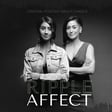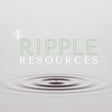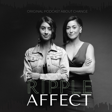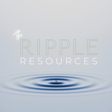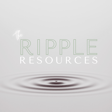Introduction to The Ripple Affect Podcast
00:00:04
Speaker
You're listening to The Ripple Affect with your hosts Cheech and Nippy, a podcast that explores how individual change has the capacity to affect the whole. From neuroscience to donuts, we're two sisters with a deep curiosity for ancient wisdom and modern knowledge, and we're obsessed with learning alongside you because we don't know. Let's dive in.
00:00:28
Speaker
Welcome to another episode of the Ripple Affect podcast.
Kiara's Personal Journey and Vulnerability
00:00:32
Speaker
This is your host, Kiara Cheech, and I'm going to dive right into my tactical episode with you today. It's a tactical bite, and I'm doing it a little differently. I'm going to share a personal story of growth and transformation. I really hope that you can take something away from this.
00:00:50
Speaker
So I can trace the origin of my journey into personal growth and change to many places, but one area continues to be a thread that if I tug on it, it always brings more movement and expansion. And that area is vulnerability. In trying to understand myself, it became abundantly clear that I had been taught things that didn't serve me about being vulnerable, or in most cases, I wasn't taught at all. And then I found Brene Brown, the power of vulnerability.
00:01:15
Speaker
An audiobook and TED Talk by the same name offered redefinitions from her qualitative research to help point me in a new direction. If you know who she is, I hope this episode can remind you to stay connected to her work. It's awesome. If you don't know Brene Brown, she's a researcher, storyteller, and author who spent two decades studying courage, vulnerability, shame, and empathy. Her viral TED Talk on YouTube is a tip of the iceberg of a wealth of information for personal, social, and professional shifts and change.
00:01:44
Speaker
Whenever I explore the depths of a subject like vulnerability, I find it essential to recognize the power of definitions and shaping our perceptions and actions.
Understanding Vulnerability and Shared Language
00:01:52
Speaker
To share a meaningful conversation, we have to have a shared language. You have to understand the words I use, and we have to agree silently or out loud on a shared definition of those words in order to connect in any type of meaningful way, whether to disagree, debate, learn, or trust. Having a conversation with ourselves is no different.
00:02:10
Speaker
Defining what things mean shapes not only the world we see, but how we see ourselves, what actions we will be brave enough to try, and those behaviors reflect back to us our identity. Definitions matter. The definition of vulnerability when you search it up is the quality or state of being exposed to the possibility of being attacked or harmed, either physically or emotionally. This definition by Google basically explains vulnerability as weakness.
00:02:38
Speaker
And commonly, vulnerability is misconstrued as weakness, a flaw to be masked and guarded against. Dictionary.com also defines vulnerability as an openness or susceptibility to attack or harm, but adds a willingness to show emotion or to allow one's weaknesses to be seen or known, willingness to risk being emotionally hurt. In emergency management, vulnerability is defined according to the different types of losses.
00:03:03
Speaker
The vulnerability can be defined as physical vulnerability or economic, social, and environmental vulnerability. Definitions serve as our guideposts. They illuminate the path and clarify our direction, but these definitions don't really touch on why it's hard, why vulnerability is fucking hard, or what it even feels like, other than to say it's probably meant to be avoided.
00:03:25
Speaker
But I've learned from experience that that doesn't serve us, and it does not help to shift change and grow. These interpretations skew the true essence of vulnerability and its profound impact on our lives. In this episode, I will share my vulnerability, not as weaknesses, but as a fundamental element for authentic connection and necessary for my genuine personal growth, and one of the ways I've learned to connect with myself and start to trust.
Shame, Emotional Growth, and Self-Trust
00:03:51
Speaker
So often with emotional vulnerability comes shame, and shame is something we definitely don't want to talk about because it fucking sucks. Shame also keeps us closed to not only to others, but more importantly to our own heart. That's what I believe. I think the biggest growth I've experienced is when I started to test how my vulnerability was an asset and an antidote to my fear. That shame lessened when I was courageous enough to risk being vulnerable. Not with everyone right away.
00:04:19
Speaker
It started with me telling myself the truth about things I had very little forgiveness for. For example, I was unhappy in my marriage.
00:04:31
Speaker
I hated what I was pursuing as the career that I chose. The love that I had was missing. Fuck. I felt I wasn't a good friend. I had debt that I didn't know how to get out of. Fuck. Fuck. And I did what any self-respecting Brown person would do. I hid. Of course I did. Who smiles and walks through a social media Photoshop life and promotes their perceived flaws. I had no space for forgiveness because the framework was that I had failed and I was bad.
00:05:01
Speaker
Not that I did something bad. Guilt. But I was bad. Shame. My perceptions and my fear of being exposed kept me closed off and hidden. If I could hide long enough, maybe I could avoid feeling the pain of being found out. But the opposite happened. I felt more pain in the closet. The closed loop circuit brought no new information in, and I didn't feel safe. I felt alone.
00:05:29
Speaker
There wasn't a closet. It was a prison of my own self-perception. I want to share an excerpt here. We've been raised in a world where being vulnerable is associated with failure and disappointment, while success and strength are considered more important than connecting with our feelings. That's from Blink List's recap of Brene Brown's Daring Greatly, which is my vulnerable admittance that I'm not perfect enough to know the shit my heart or reread the entire book as I prep for this episode. And yeah, I used a shortcut.
00:05:58
Speaker
Of course, the summary is really helpful and shout out to Blinklist. But this, this excerpt, this was me. We've been raised in a world where being vulnerable is associated with failure and disappointment, while success and strength are considered more important than connecting with our feelings. I cut myself off from feeling because I was more concerned with success. Success, I believed, came only from being strong, independent, and something like a martyr at times, most times.
00:06:26
Speaker
Through external validation, I understood my worth. If I felt deeply into any given moment of my experience, it would require me to put myself first and that was unacceptable. I found out then, and so I do it now, that being honest is key. When I was locked in my prison of my own misperceptions, telling the truth was my first step to exploring how to be free.
00:06:47
Speaker
I had to tell the truth to expose the lies and see what else was there. What's ironic is that when I came in contact with the importance of feeling my feelings, I began to recognize what shame was, how I experienced it, and then I could start to examine the difference.
Building Resilience and Embracing Flaws
00:07:02
Speaker
Vulnerability wasn't weakness. My fear, my shame was.
00:07:06
Speaker
Because as Brene Brown articulates, shame is a fear of disconnection. And as a species, we are hardwired for connection. And the belief I had back then was if I exposed my deepest flaws or any flaws, I wouldn't be worthy of connection.
00:07:22
Speaker
I'm going to be fucking real. I still feel that way. I'm in the process always of building more resilience to shame because shame is used as a way to combat our vulnerability. If I feel shame, then my trauma, the mind will give me all kinds of things to do to try to run from my vulnerability and hide my perceived flaws, my unforgivable mistakes. But all it does is drive the wedge in deeper between me and my authenticity. My vulnerability is my being. Being is accepting what is.
00:07:52
Speaker
Okay, so how do we become shame resilient? Talk about it out loud with others. Its power is diminished when brought out into the light. In other words, vulnerability is being seen. This is why I'm bringing this subject as my tactical bite to this podcast. This podcast is an opportunity for me to be seen.
00:08:12
Speaker
The passion is to bring what's alive in me out into the world, and it feels fun, aligned, and creative, and free. And for all those reasons, it's fucking scary. It's vulnerable.
00:08:27
Speaker
The vulnerability comes from the joy I feel, and it triggers the shame in me of not being good enough. Today, right now, I can feel all the reasons I should not be sharing this, but I can also feel all the reasons why I have to. I've learned to trust the tip of the scale in the direction of my vulnerability is my strength. Today, I do have a stronger sense of love and belonging because I've cultivated a belief that I'm worthy of love and belonging.
00:08:55
Speaker
And this is all directly from Brene Brown's original book and TED Talk and research on who she originally labeled in her findings, the wholehearted. She found these people that emerged in her data, her interviews that had the courage to be imperfect by being compassionate and who found connection as a result of authenticity.
00:09:14
Speaker
She found that people who feel a strong sense of love and belonging believe in the necessity of vulnerability. They possess the courage to be imperfect, have compassion, authenticity, and the willingness to invest in the unknown. When I listened to this TED Talk and found the audiobook, I found a new aim. Rather than seeking perfection as a path to be loved and really as a way to try to avoid the feelings of shame,
00:09:38
Speaker
I shifted my focus on finding out what made me authentic in a radical hope that I could be loved because of my flaws. This would take years, and as I said, I'm still doing this process because it made no sense to me and it still does not make sense to my perfectionist brain. But my heart knew it was right. That journey into the new quest to understand the ridiculous possibility that the very things I wanted to hide the most about me could be the reason why I was worthy of love,
00:10:05
Speaker
made absolutely no logical sense to my brain as I said, like at all. So it was a journey into the unknown for sure, one that I've needed a lot of support along the way. And I want to offer that support back to you, the hand reaching back to pull you forward if you need it. So how does vulnerability support change?
00:10:25
Speaker
If anything I've said so far is at all relatable to you or someone that you know, I want to offer some helpful anecdotal tools that have supported my growth and change.
Tools for Embracing Vulnerability
00:10:35
Speaker
Lessons from my own vulnerability journey. Firstly, you are not alone. That is so important. When I started working on these concepts of feeling scared but leaning into courage to start sharing openly what my shame felt like and
00:10:50
Speaker
What my inner dialogue said, more and more people admitted they felt the same way. Imposter syndrome, not feeling enough, and feeling guilt and shame about it. Feeling wrong. All the time. The other beautiful thing I discovered was that trusted people are an important check of the accurate reflection of you.
00:11:09
Speaker
Your brain won't always tell you the accurate stories of you. Those you can trust, which is an important distinction that I want to speak on more in a moment, those that you can trust will hold space for you. Using another excerpt from the same blinklists, by understanding and verbalizing our shame, we build a resilience to it and experience others' empathy instead.
00:11:31
Speaker
Like, I have clear moments of friends explicitly telling me that the very thing I was being so hard on myself for, the messy mistake or the uncomfortable emotions, was the reason why they loved me.
00:11:45
Speaker
When I couldn't believe or hold that truth for myself, I couldn't love myself for these flaws. Others did. Again, trusted people in your life can affirm for you they love you because of your faults. And then you can learn to love you too. Seeing the unconditional starts with recognizing there are conditions and then choosing to be brave enough to test those perceived limitations.
00:12:09
Speaker
Okay next, on choosing to open up with people, trust and boundaries are a key part of vulnerability. On this subject too, Brene Brown is a crucial resource. One quote I came across a lot from her work was, daring to set boundaries is about loving yourself even when we risk disappointing others.
00:12:27
Speaker
And more recently in her book, Atlas of the Heart, she wrote, boundaries are a prerequisite for empathy and compassion. We can't connect with someone unless we are clear where we end and they begin. If there's no autonomy between people, then there's no compassion or empathy, only a measurement. End quote. This was a foundational learning for me as an empath.
00:12:51
Speaker
One more note on boundaries. I was looking at my notes from her book Dare to Lead, Brave Work to Have Conversations, Whole Hearts. It's Brene Brown's leadership guide. The note was, trust comes before vulnerability. We need trust to be vulnerable.
00:13:07
Speaker
and you need vulnerability to build trust. It's like a really weird cycle. So what does that mean when attempting to lean into vulnerability with another? For me, it was learning to feel worthy enough to trust myself. If I could trust myself to not be mean, critical, and show myself love in difficult situations, I could trust others to do the same.
00:13:28
Speaker
I had to set boundaries for myself and my own behavior and my own self-talk, which took me to examining self-respect. But that's a different and important conversation. What I will say is that self-respect is tied to self-care. When researching for this episode, I found an article from blueoso.com summarizing Brene Brown's work, and it said, self-care is seen as a way to protect oneself physically and emotionally, which is essential for maintaining healthy relationships.
00:13:56
Speaker
I think that's a fundamental reminder and self-care is a tool that I had to list because I had to learn so much about it in my journey of vulnerability.
The Role of Risk and Support in Vulnerability
00:14:06
Speaker
Okay, third tool, control is not cool. In the gifts of imperfection, Brene Brown has 10 guideposts for wholehearted living. One is letting go of being cool and always in control. And you cultivate this with laughter, song, and dance.
00:14:24
Speaker
I think of it as not taking ourselves too seriously, a reoccurring attempted theme in this podcast. In her other book, Rising Strong, The Reckoning, The Rumble, The Revolution, it's another really great book. She writes, vulnerability is not winning or losing. It's having the courage to show up and be seen when we have no control over the outcome. Vulnerability is not weakness. It's our greatest measure of courage. I love that.
00:14:53
Speaker
I have no control over how others will react to anything I do. That is a hard reckoning I've had to face over and over, but it's the fucking truth. I can't control whether you'll understand or like anything that I say on this podcast.
00:15:08
Speaker
I can't control whether you'll misunderstand or dislike anything I say. And that one is hard for me, especially as a recovering perfectionist, which is my anecdotal tool number four. Perfectionism is pretend control. Along the way in this journey, I discovered that somewhere deep in my brain and my subconscious light, the belief that if I could just be perfect enough, I could control how others felt, thought, spoke about and treated me.
00:15:35
Speaker
I would be understood, appreciated, recognized, and ultimately loved. Control in this fantasy just meant to affect the outcome of my actions enough so that I didn't feel pain. And here's where I want to insert Brene's definition of what perfectionism is and is not.
00:15:52
Speaker
Perfectionism is a self-destructive and addictive belief system that fuels this primary thought. If I look perfect and do everything perfect, I can avoid or minimize the painful feelings of blame, judgment, and shame. And yeah.
00:16:07
Speaker
That's what I unknowingly believed for decades. Perfection means no pain. But the opposite is actually true in my experience. Trying to be perfect doesn't help heal the wound, it doesn't keep me safe, and it doesn't control shit. It just keeps me chasing an unlivable ideal and feeling shame when I'm not able to attain it.
00:16:28
Speaker
It's a vicious cycle and I just want to be off of it. And I want that for you too if you're experiencing it because if you can relate, I gently suggest doing the opposite of whatever the fuck perfection tells you to do. And here's tool six, start small.
00:16:48
Speaker
Vulnerability in my experience works in the tiniest of doses, because it's linked to our heart and how much we care and how much we want and desire for ourselves. And our hearts are a powerful amplifier for our resilience, so a little goes a long way. Vulnerability looks like risk-taking. A risk is a risk no matter the size, and you get to set the parameters.
00:17:11
Speaker
When you're in a mental prison trying to break out, just testing your perceived limitations is enough to start the cycle of shame, and surviving the test is enough to build trust. Because when we risk letting go of perfection, you cultivate compassion. And that is another one of Brene Brown's 10 guideposts for the wholehearted living. I found it so helpful. Okay, tool seven.
00:17:35
Speaker
Telling the truth and receiving support is key to your survival. Vulnerability for me at first looked like telling the fucking truth. The only way I was able to break down this intense do it all on my own toxic independence was to start to admit I needed help. But to realize I needed help, I had to face the truth that I was struggling. I had to
00:17:56
Speaker
be worthy of that help. I was struggling to get things done, struggling to feel good even when I did. Support was a mountain and I first started climbing it through groups. For instance, I joined a mastermind group and shout out to Jodi Bentley and the artist's mastermind.
00:18:13
Speaker
While I was reading Brene Brown staring greatly, I was in this group and I had this moment that impacted my trajectory, for sure. And it was a realization that telling the truth meant asking for support. Asking for more support, actually. The structure of the group was 20 minutes or so of presentations and feedback and five minutes to request for support with weekly accountability partnerships for career-related tasks.
00:18:38
Speaker
Admitting I needed a greater amount of help than I perceived as a part of the structure was honestly gut-wrenching. In those five minutes of support, I was so tense, like my throat closed, my eyes started watering. I fucking hate that I cry when I get scared. And I was scared, but I told the truth.
00:18:59
Speaker
I confessed I needed daily check-ins instead of just one weekly call, with no reciprocation expected from my partner that week and possibly ongoing. I mean, it felt like too much. It was an omission of my inability to manage my task list alone, a burden for someone else to bear every day with me.
00:19:16
Speaker
Shame. So much shame. To my surprise, three people volunteered to help. I chose someone I already knew rather than a stranger, reducing my vulnerability. Remember, start small. Those first few calls that I had with him were wretched. I felt so weird.
00:19:36
Speaker
But I didn't die. That person became a dear, dear friend, and those check-ins transformed my experience of receiving. I felt supported in the way I actually needed, and the game changed. Oh, and did I mention I didn't die? Which leads me to my final tool on our list of anecdotal tools. Vulnerability is not death.
00:20:01
Speaker
It can sound dramatic, but I know it to be true. Vulnerability can feel like death, or rather the fear of death, because in a way it is. It's the death of an identification with something that you believe to be true. It feels risky because it involves letting go of the need for certainty and cultivating intuition and faith, which is another one on the list of the 10 guideposts for wholehearted living.
00:20:27
Speaker
The tricky part is the only way you can experience the not dying part is to attempt to do the thing that your brain and body tells you will kill you. It's not an easy risk, my friend. It's going into the unknown, and true to its name, you cannot know the outcome.
00:20:44
Speaker
The reward isn't always glamorous. The reward is you learn. Not that you get what you want. That's not real. Always. But you learn. You learn about you. You learn about others. You get hurt. You get messy. And you survive. And that survival is how you build trust. And that trust is how you can be more vulnerable.
00:21:06
Speaker
I have to say this next part, so forgive the soapbox, but this is a privilege we have.
Privilege and Personal Change
00:21:13
Speaker
If we're sitting here listening to podcasts, talking about change and growth, then we are a small percentage of people in this world who have the space and time, the luxury of such things.
00:21:23
Speaker
So much of humankind faces physical harm, unimaginable living conditions, violent trauma, and threat to life of their loved ones and of themselves. If you're listening to this and that is you, my heart is in agony with you. Please have the strength to keep hope alive and know that people do care about you. None of this makes sense, but your experience and your life matters.
00:21:46
Speaker
And if that's not you, you're in no imminent threat of loss of life. Recognize that circumstance as the gift that it is. You deserve that gift. Just as much as the person who deserves to be safe from physical danger, persecution, oppression deserves that right.
Conclusion and Call to Action
00:22:03
Speaker
Rights are gifts, and like any gift, you get to choose what to do with it because it's yours.
00:22:08
Speaker
Vulnerability is not death. It is our greatest gift. The gift of connection and authenticity. Be vulnerable with me. Because I've been vulnerable with myself and I promise I've found deeper love and I want that for you too. Thank you for being a part of this, Almost Clan. I trust this will be a helpful episode in your journey of recognizing Almost is vulnerable and therefore it's good enough.
00:22:40
Speaker
Hi everyone, Isa here, Nibi. If I could slow clap right now and it wouldn't spike up the sound in your speakers, I would. I feel like I could listen to that episode over and over again and grab new things out every time. But I wanted to recap for you because there was really good steps in there and I thought it would be helpful to have them
00:23:04
Speaker
in sequence and give you my little tidbits. So the first of Quiata's eight tips for embracing vulnerability is you are not alone. If you feel scared, it's safe to lean into vulnerability with those you trust. Understanding and verbalizing our shame takes practice and courage. It's the training ground of resilience and self-acceptance.
00:23:30
Speaker
The second, embrace trust and boundaries. Maybe we trust that we can express our muddy, dark shadow truths without being judged into oblivion or condemned into an eternal identity of bad. Wherever you start your trust journey, know that addressing what needs change is an act of vulnerability.
00:23:50
Speaker
The third, explore boundaries and self-care. Establishing boundaries requires us to communicate our needs, prioritize our wellbeing, and define what is acceptable in our relationships.
00:24:03
Speaker
Try this on, give it a go. It's okay to say, I want to do this and I want to do it alone, for example. The fourth, control is not cool. Letting go of being cool and always in control has power. It's cultivated by not taking ourselves too seriously. Things like laughter, dance, song can help. Five, perfectionism is pretend control.
00:24:29
Speaker
It's a self-destructive and addictive belief system used to avoid or minimize the painful feelings of blame, judge, and shame. Number six, start small. A little goes a long way. Risk letting go of perfection to cultivate compassion. Asking for help, admitting you need help. They may never feel small, but they are doable. Whatever's doable, do that. Seven, tell the truth and receive support. You are worthy of help with that truth.
00:24:59
Speaker
I'm gonna say that again. You're worthy of help with that truth. Honesty breaks down barriers and fosters self-acceptance. Once you say it out loud, you invite others to support you and you let them know it's okay to do the same. Eight.
00:25:18
Speaker
Vulnerability is not death. I like this one. It's shedding the ties to old truths, a risk of relinquishing certainty for intuition and faith. But you will survive, even if your brain and body tells you you won't. Go into the unknown. The reward is not always glamorous, but you learn and the learning will make you a more complete version of you.
00:25:42
Speaker
Alright, as always, if you need a trusted pair of sisters to share your vulnerability with, we're here. Okay, I think we did it. Listen.
00:25:55
Speaker
I don't know what we did, but we did it. Look, unattainable ideals are overrated. We're way more connected and deserving than society's false sense of separation dictates us to be. You're not just one person, you're enough. Your effort is enough and change is possible. Question the standard that says otherwise, because what if almost is good enough?
00:26:21
Speaker
Just by tuning in, you're part of our clan. Not in a cult way, though. We don't know how far this ripple can go, but we're going to keep showing up. And we'll never get to perfection, but we're all going to be okay if we let the process be the solution and we see the value in the attempt. Thanks for listening to another episode of the ripple affect. We're looking forward to exploring a different facet of change with you next Tuesday. Same time, same place next week.
00:26:50
Speaker
For show notes and additional resources, check out our website at rippleifeckpod.com. That's affect with an A. Kia ora has worked diligently to make our website interactive.
00:27:01
Speaker
Please visit it so it wasn't all for nothing. In all seriousness though, there's a ton of resources there. DM us directly at rippleeffectpod on Instagram and let us know what you liked about our show or any of your own ideas. We're really excited to hear from you. We value your feedback because it helps us make the pod better and it's our way of including you in our process.
00:27:24
Speaker
Okay, so ratings aren't the point of why we do this. We really want to make a change in the world. But in The Matrix, they're all our algorithms. So yeah, every single review we get helps the ripple go farther. To help us out, please take two seconds, find the ratings and review section on whatever platform you're listening from, click five stars, wink, wink.
00:27:47
Speaker
and leave a review. We know you're busy, so just saying hello or literally hi as the review helps us hack the matrix. We sincerely appreciate it. If you want to become officially initiated into our clan, again, not in a cult-y way, hit the subscribe button wherever you get your podcasts. And as always, we're in it with you. Keep questioning. Stay curious. You got this, clan.
00:28:15
Speaker
A special thank you, love, and credit to the magnificent Mia Casasanta for this beautiful music you're listening to right now.


